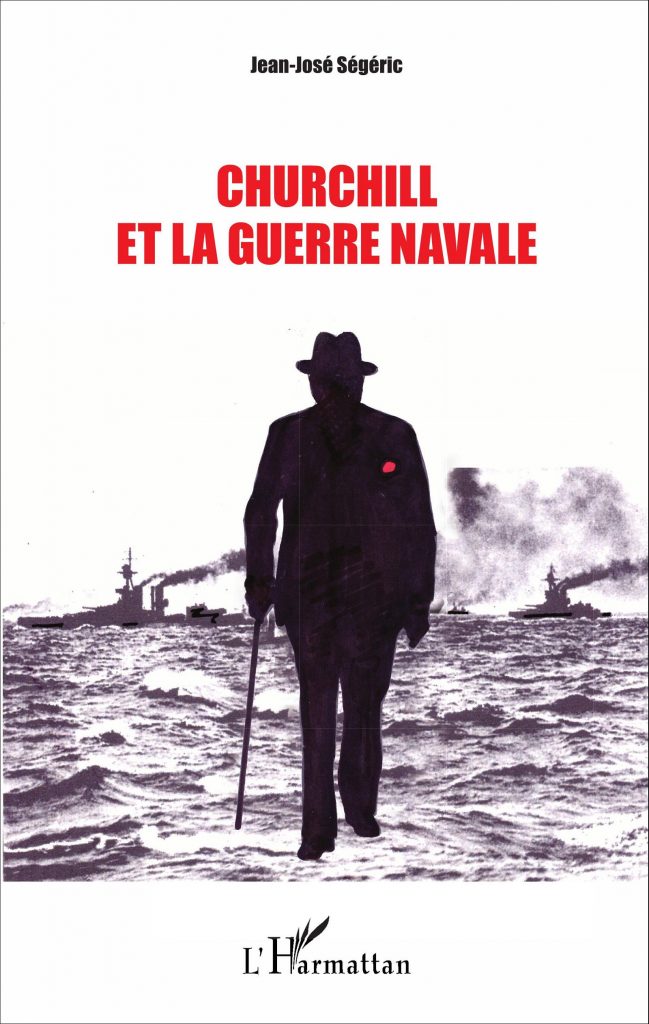
Finest Hour 179
Books, Arts & Curiosities – Un navire qui coule à pic

April 22, 2018
Finest Hour 179, Winter 2018
Page 46
Jean-José Ségéric, Churchill et la guerre navale, Paris: L’Harmattan, 2016, 435 pages, €39. 978–2343089980
Review by Antoine Capet
Antoine Capet is the former Head of British Studies at the University of Rouen. His book Churchill: Le Dictionnaire was published in January by Perrin.
The old saying, “the cobbler should stick to his last,” is frequently disproved—but not in this book. Captain Ségéric, retired from the French merchant navy and also a former officer of the naval reserve, must evidently be more at ease at the helm of a ship than with a pen. He is a poor writer: his French grammar and spelling would shame a schoolboy, his choice of words often wrong, and his sentences occasionally broken by incomprehensible punctuation. To make things worse, the proofs were clearly not read, leaving a deplorable number of typos. Readers with some knowledge of English or German will also notice how the author and publisher did not even bother to make sure the words quoted were correctly copied out. Added to this, Ségéric is completely lost in the complexity of British political history, describing Aneurin Bevan as an American, writing twice that Churchill became First Lord of the Admiralty on 1 October 1939, asserting that Churchill had four children, and speaking of “Air-Marshal Tedder of the USAF.”
Like any author discussing Churchill and sea operations, Ségéric has to examine the Dardanelles expedition—Churchill’s degree of responsibility in the discomfiture, and the long-term consequences of the decisions he made regarding naval aff airs: financial in the 1920s and operational in the years 1939–1945. The reader gets the impression that Churchill learnt nothing from the fiasco of 1915, as his impulsive nature always inevitably got the better of him, even in his later years. The book presents the Norway campaign of 1940 as the best illustration of Churchill getting out of his depth because of his misplaced self-confidence. Whereas many people today hail his perseverance, Ségéric disapprovingly gives an unsourced quote (“Success is going from failure to failure with no loss of enthusiasm”) with the idea that this supposed recklessness was bound to make him a poor naval overlord. But the book is not an undiluted enterprise in condemnation, as Ségéric laboriously strives to apportion blame and praise according to his lights, which are unfortunately severely limited.

2025 International Churchill Conference
On the Mers el-Kébir (Oran) “tragedy,” the author uses Churchill’s own words in The Second World War. Ségéric stands resolutely with the Gaullist side: those to blame are primarily Admirals Darlan in Paris and Gensoul on the spot, who unconscionably refused the honourable way out off ered by Churchill. Overall, Ségéric approves of Churchill’s Mediterranean strategy—his only real reservation being the Prime Minister’s decision to send British troops to Greece in 1941. Yet he glosses over Churchill’s later justification that, though he knew the move was doomed to failure, it had to be made since Britain had a pledge to Greece—and he wanted to show that the time of broken commitments like the Munich betrayal was definitively over. Ségéric also fails to take into account Churchill’s constant eye on isolationist and often anti-British opinion in the United States, which one more British “surrender” would have bolstered. This appears to be a recurrent shortcoming in the book: Ségéric always forgets how conscious Churchill was of his painful dependence on American goodwill.
Likewise Ségéric seems to forget how Churchill had to placate Stalin in view of the repeated delays in the opening of the Second Front. Ségéric does often have a balanced judgement on Churchill’s major decisions—but not on what he describes as the Prime Minister’s greatest mistake in the Battle of the Atlantic: his allocation of forces to Bomber Command for the raids on Germany at the expense of the expansion of Coastal Command, which Ségéric argues would have paid much higher dividends. But here again Churchill had to walk a tight rope between the actual damage inflicted to German submarines and the potential resulting damage to relations with what was then his major ally on land, with the underlying fear of a separate peace in Eastern Europe.
Churchill et la guerre navale contains little which Finest Hour readers familiar with the existing literature on the subject in English do not already know. On the French market, however, the volume does fill a gap, and it is a pity that the structure and style are so defective and the narrative in such atrocious French that many readers will be quickly discouraged from reading: a missed opportunity if ever there was one to make this aspect of Churchill better known to the French general public.
Subscribe
WANT MORE?
Get the Churchill Bulletin delivered to your inbox once a month.
Oops! We could not locate your form.
Privacy



